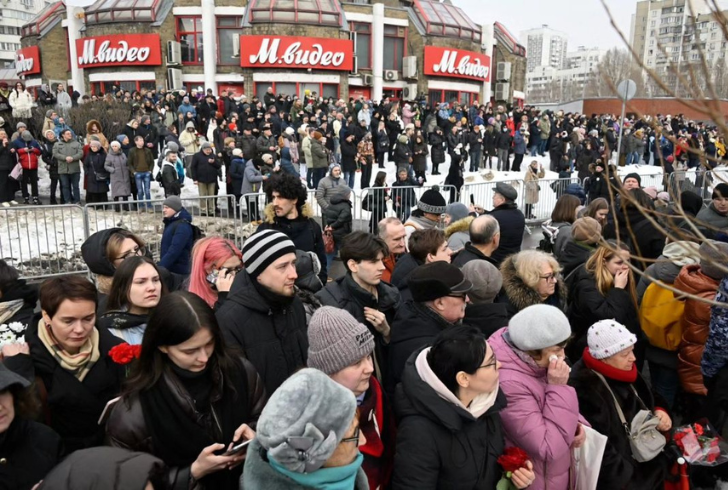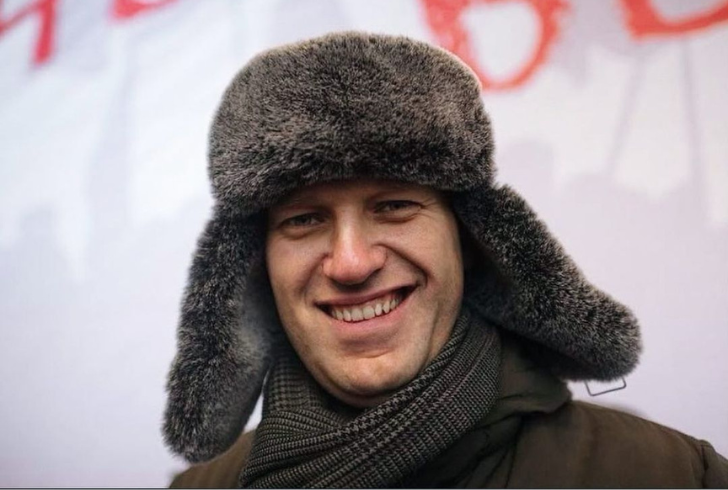Russian Opposition Icon Navalny Buried in Moscow, Supporters Rally in Solidarity
A Conflicting Cause of Death
Navalny’s death certificate listed “natural causes,” but his supporters dismiss this explanation. His widow Yulia stated that her husband was “killed in prison by Putin’s henchmen.” U.S. President Joe Biden agreed, saying, “Putin handles Navalny’s death because he suppressed free speech and political opposition.” The Kremlin has denied any involvement.
Navalny fell ill on a flight from Siberia to Moscow last August and was airlifted to Germany for treatment. Lab tests revealed poisoning with the Soviet-era nerve agent Novichok. He was arrested immediately upon returning to Russia in January 2021. Supporters have described squalid prison conditions and a lack of proper medical care. Allies say the opposition leader lost significant weight and complained of back pain and numbness in his legs and hands in his final months.
Defiant Crowds Gather Across Russia

Instagram | ndtv | Desire to bid farewell to Alexei Navalny outweighs fear of detention.
While the Moscow memorial proceeded without incident, authorities elsewhere moved to suppress gatherings in support of the slain activist. Police detained over 130 pro-Navalny protestors in over 25 Russian cities who heeded calls to mourn his death.
Demonstrations took place from St. Petersburg to Novosibirsk despite official warnings. “The desire to say goodbye and pay tribute to Alexei Navalny is stronger than the fear of being detained,” said organizer Ruslan Shaveddinov on social media.
The harsh crackdown came amid Kremlin fears that Navalny could become a potent political symbol and rallying point for the opposition movement from beyond the grave. Officials blocked mourners from viewing his body upon arrival in Moscow from the penal colony and delayed handing over his remains to family.
World Leaders Condemn Russian Authorities
Navalny’s death elicited outrage from Western capitals. U.S. Secretary of State Antony Blinken lambasted Moscow for “eliminating anyone seen as a threat to Putin’s power.” German Chancellor Olaf Scholz called the prison conditions “unacceptable.”
A joint statement from the G7 foreign ministers said Navalny was “the victim of a systematic campaign against dissenting voices and independent civil society by the Russian authorities.” Kremlin spokesman Dmitry Peskov fired back, blasting the condemnation as “politicized and one-sided.”
Navalny’s Lasting Legacy
Despite authorities attempting to cut his funeral’s impact, Navalny’s legacy as the fiery vanguard of Russia’s opposition movement seems assured. A tireless anti-corruption investigator, he amassed a nationwide following through viral YouTube exposes and a popular blog before emerging as Putin’s most prominent domestic critic.

Instagram | robpruitt5000 | Navalny’s legacy as a fierce leader in Russia’s opposition movement is secure.
His supporters hope outrage over his death will reinvigorate challenges to the Kremlin. “We have to keep going. The fight for a bright future for Russia is continuing,” said activist Vladimir Milov following news of Navalny’s passing. Mass demonstrations over his arrest rocked Moscow last year in a major challenge to Putin’s rule.
Even absent regular street protests, Navalny’s team still aims to chip away at the Kremlin’s power monopoly through tactical voting campaigns and corruption investigations. “We are finding new forms of work, adapting to the new reality,” said press secretary Kira Yarmysh.
While Putin looks entrenched, Navalny’s backers say he succeeded in exposing corruption at the highest levels and stirring demands for democratic reforms. “When a great avenger appears, he is presented as a future president,” said ally Leonid Volkov. “Navalny wasn’t able to become president, but he created a strong political organization.”
The Enduring Crackdown on Dissent
Against this backdrop, Navalny’s funeral became a rare opportunity for weary dissidents to come together in solidarity and grieve their fallen comrade. In death as in life, Navalny continues representing the ideals of truth and justice to so many Russians. And the crowds shouting “We will not forget! We will not forgive!” made clear that his legacy will live on.
Despite the risks of defying authorities to honor Navalny, teacher Irina Dachko felt a moral obligation to pay her respects. “If we remain silent, then tomorrow, any one of us could be in Alexei’s place,” she reflected after exiting the memorial service. “We cannot allow that to happen.”